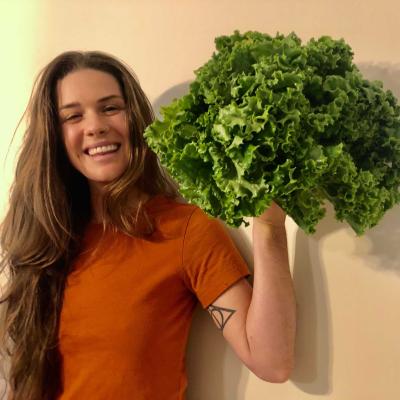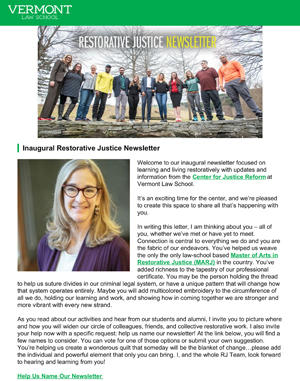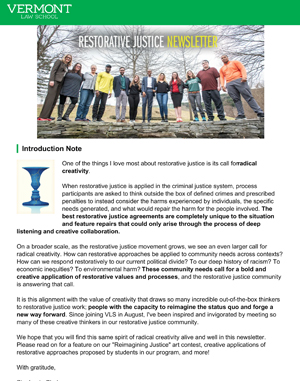
One of the first students to enroll in the Master of Food and Agriculture Law and Policy degree at VLGS, McKenna Hayes MFALP’16 now directs the Food Hub at Food Connects, a nonprofit delivering local food, educational programs, and consulting services to the local Vermont food system.
By Margaret Wilson
Like most people, McKenna Hayes MFALP’16 didn’t arrive at Vermont Law and Graduate School (VLGS) with a passion for regulations.
But after graduation, Hayes realized quickly that the regulatory framework (and its foibles) that she learned about while earning her master's in Food and Agriculture Law and Policy is fundamental to creating a functioning food system.
In her current position as Food Hub Director for Food Connects, a Brattleboro-based nonprofit that delivers local food, educational programs, and consulting services to the local Vermont food system, Hayes is using the research she conducted at VLGS’s Center for Agriculture and Food Systems (CAFS) to help ensure that Food Connects’ programs are successful.
“As we learn [at CAFS], the regulatory framework impacting food systems can be fragmented and is dispersed across various agencies,” said Hayes. “Food Hub operations must be in compliance with a wide variety of regulations coming from the USDA, FDA, DOT, OSHA, and more.”
During her studies, Hayes conducted an Independent Research Project with CAFS that focused on a regulatory assessment of a small distribution program at Rutland Area Farm and Food Link, where she was volunteering at the time. “Some of the compliance issues I’ve worked through at Food Connects are similar to the topics identified in that project,” explained Hayes.
However, an understanding of regulations is not the only thing Hayes feels she gained from her time at CAFS.
“My degree elevated my problem-solving and systems thinking skills, and expanded my general perspective,” said Hayes. “The issues impacting our food system are complex; they don’t have a single clear cause or solution and it takes systems thinking to understand how we got here and imagine where we go next.”
One clear benefit of a CAFS education, according to Hayes? Lasting connections built between alumni, faculty, and staff. Hayes credits her degree for teaching her the right questions to ask, and who to ask them of. “If I can’t figure [a problem] out—I’m so lucky to still work closely with CAFS. They have received so many random food safety-related questions from me!”
Hayes continues to work closely with CAFS in her capacity as Food Hub Director, working with clinic participants in 2019 to conduct a regulatory assessment of the Food Hub that provided a helpful breakdown of necessary permits and licenses. Today, she is working with CAFS students and faculty on an upcoming Food Safety and Compliance Toolkit.
"The issues impacting our food system are complex; they don’t have a single clear cause or solution and it takes systems thinking to understand how we got here and imagine where we go next."
–McKenna Hayes MFALP'16
Prior to coming to Vermont Law and Graduate School, Hayes lived in Boston and worked in the grocery sector, focused on corporate sustainability. Wanting to return home to Vermont, the Burlington native learned about the school from her sister, who was a student at the time.
Hayes was one of the first students to enroll in the Master of Food and Agriculture Law and Policy degree. By building connections with local nonprofits like Rutland Area Farm and Food Link, Hayes eventually transitioned the work she did at CAFS into a career in food distribution that eventually ended up at Food Connects.
Hayes recommends that recent and upcoming graduates get comfortable with getting their hands dirty. “There’s so much work to be done—don’t narrow your possibilities with a rigid mindset of what you ‘should’ be doing.”
She also encourages students to volunteer, provide support, or otherwise get involved any way they can with the work they’re interested in.
“The number one piece of advice I always give future graduates: position yourself as the person that comes to mind when someone needs help,” Hayes explains. “Get involved as best you can and work hard. Eventually they will think of you next time they need help.”


















